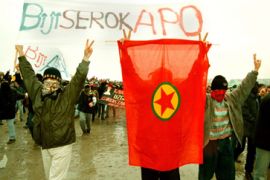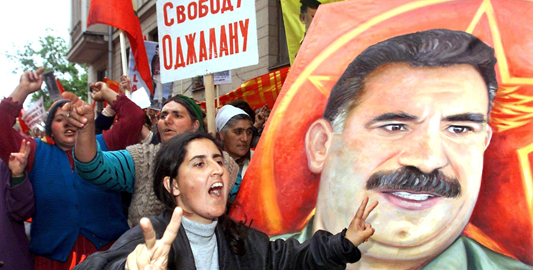PKK: Kurdistan Workers’ party
PKK ideology is founded on revolutionary Marxism-Leninism and Kurdish nationalism.

 |
| PKK founder Abdullah Ocalan was sentenced to death by a Turkish court in 1999 [EPA] |
The Kurdistan Workers’ party (Kurdish: Partiya Karkeren Kurdistan, PKK) is an armed group established in the early 1970s.
Its ideology was based on revolutionary Marxism-Leninism and Kurdish nationalism.
Abdullah Ocalan founded the party in 1974 and it was formally named the Kurdistan Workers’ party (PKK) in 1978.
The goal of the PKK has been to create an independent socialist Kurdish state in a territory which it claims as Kurdistan – an area that includes parts of southeast Turkey, northeast Iraq, northeast Syria and northwestern Iran. These states oppose any such change.
The PKK uses force and the threat of force against both civilian and military targets for achieving its political goals.
It is listed as a “terrorist organisation” by a number of states and organisations, including the US, Nato and the EU.
Thousands killed
The PKK took up arms against Turkey in 1984 with the aim of creating an ethnic homeland in the southeast. More than 30,000 people have been killed in the conflict since then.
In 1999, Ocalan was captured and sentenced to death by a Turkish court. His sentence was reduced to life imprisonment in October 2002 after Turkey abolished the death penalty.
Fighting subsided after Ocalan’s capture and led to a ceasefire and the withdrawal of fighters from Turkey.
After his arrest, Ocalan stressed the importance of achieving rights for the Kurds through politics rather than the armed struggle.
This encouraged the group to establish a political wing known as Kongra–Gel in November 2003.
In June 2004, the PKK announced the end of its ceasefire and told investors and tourists to stay away from Turkey.
In April 2006, the authorities blamed the PKK for rioting between pro-Kurdish protesters and security forces in Turkey‘s southeast in the worst civil unrest since the mid-1990s.
About 3,000 PKK fighters are based in northern Iraq and launch attacks on security and civilian targets in Turkish territory. A few thousand PKK fighters are also believed to be inside Turkey.